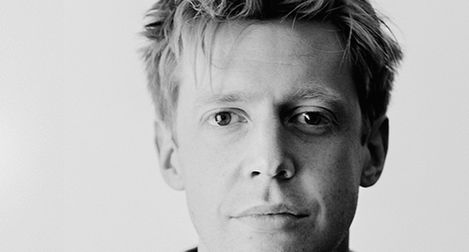James Spinney
James Spinney co-directed his first feature, Notes on Blindness, with Peter Middleton. The film premiered at Sundance and was released in the UK on 1 July by Curzon Artificial Eye.
What’s your connection to the British Council?
Our first contact with the British Council was in 2013 when our short film, Rainfall, made it into Hot Docs in Toronto. Out of the blue, we received an email from the British Council/BFI shorts support scheme (read more about the travel grants here), offering to help me and Pete travel out to Toronto and promote the film. There’s no way we would have been able to go to Canada without their help - or to Utah the following year, when our next short film was accepted into Sundance. Those were our first experiences of film festivals, which proved incredibly important in building support for our feature film.
With Notes On Blindness, the British Council also helped screen the film to festivals (read more about the festival selectors screenings here).
We also recently took part in a British Council podcast recorded at Sheffield Doc/Fest about virtual reality and empathy (listen here).
What are you working on right now?
We've just released Notes on Blindness, our first feature. It’s an account of losing sight, told through the audio recordings of the theologian John Hull, who became blind in the early 1980s and began recording his reflections on cassette. Those original recordings form the basis of the film’s soundtrack, interwoven with more recent reflections from John and his wife, Marilyn, but on screen their voices are lip-synched by actors - the brilliant Dan Skinner and Simone Kirby. The film follows John and Marilyn's journey, over six years, through loss, rebirth and renewal. The film has been released in cinemas and on demand with several different soundtracks, including versions designed for blind and partially sighted audiences. And it’s accompanied by a virtual reality experience, which you can download for free.
What originally turned you onto film?
I think probably making films with my Dad as a child. He was a teacher and in the holidays we used to borrow the school’s video camera - an enormous hulking beast - together with a rusty stage lamp which gave off that brilliant smell of burning dust. And the brightness of the spot-light captured on Hi-8 video gave everything an other-worldly quality. At first we filmed magic and illusions, then Dr Who inspired sci-fi epics, all filmed in sequence, with inkjet-printed title cards.
I also remember a teacher of mine who gave me a stack of videos - I must have been about thirteen - including films by Ingmar Bergman and Satyajit Ray. I remember being pretty baffled by them at the time and even being embarrassed when giving them back to him as I didn’t really know what to make of them. But I’ve found myself going back to those films every few years since then. I need to write and thank him.
What’s the first film you remember seeing? What was so memorable about it?
I have a vivid memory from the age of maybe five or six, of watching a film about Medusa with my sister. We were terrified that if they showed her on screen, we’d both be turned to stone.
What has been your career high so far?
It’s tricky - filmmaking is such a fragmented process, it’s hard to pick one moment . At a screening a couple of weeks ago, we were together with John’s family and the cast and crew, with the film finally out in the world and there was a sense of the huge journey that we’d all in different ways been part of. I always wonder what powers such an enormous, sometimes exhausting, often complex thing as a film production. I’m sure it’s different on every movie. In our case it was John and Marilyn: the power of his writing, and their love. Which I think was felt by everyone who worked on the film.
What’s your favourite line or scene from a film? Why?
Right now, it’s from Sleep Furiously. The scene where the director's mother describes instructions given to her by a taxidermist: to put her recently deceased pet owl in the freezer it and then post it to him in Llangollen. It’s strangely touching.
Favourite screen kiss? Why?
Can it be a near-kiss? I like the scene in Cabaret where the camera circles Sally, Brian and Max - or maybe they circle each other. They’re all wasted from the booze and high from the dancing, their faces turning to each other, their eyes meeting, looking like any of them might kiss at any moment. Special mention to the sound of the record scraping in the background as they catch their breath.
What advice would you give to someone starting off in filmmaking?
It’s hard to give useful advice, especially as everyone wants to make a different kind of film. But thinking about it, I suppose we’ve found that it’s relationships that carry films forward as much as ideas.
Sometimes when you start out you have lots of ideas but feel a bit alone, which can be hard. But there are lots of people out there in the same boat - it’s just a matter of finding the ones you get on with. I met Pete when I was filming the behind the scenes film for an indie feature - and we just got on really well. There are also people out there who have huge amounts of experience - even masters of their craft - who'll work on your films just because you get on and they like your idea. We’ve also found it helpful to make the question of how to approach something a key part of the process. That way, not knowing is the starting point.


